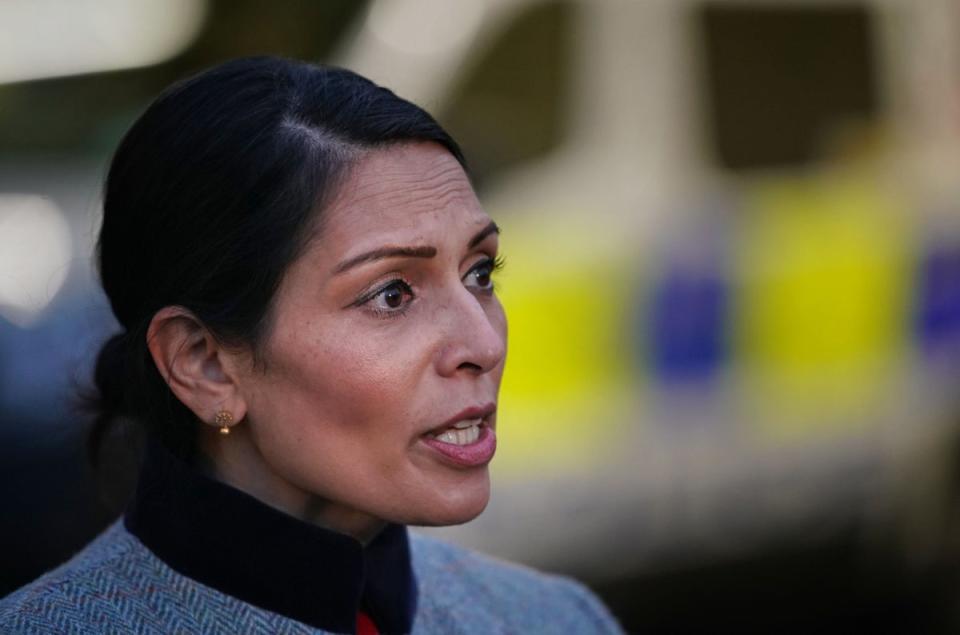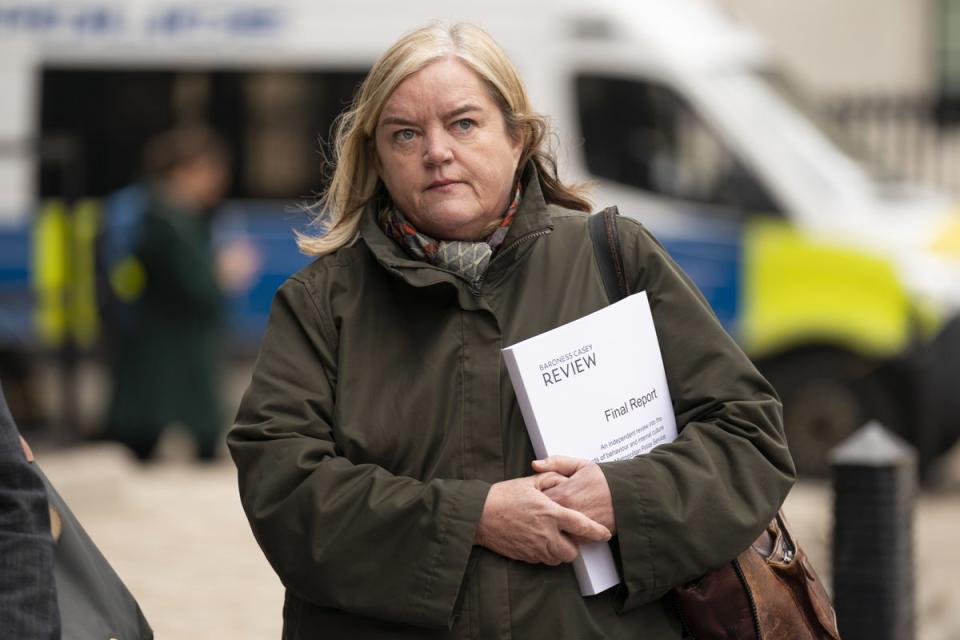Predatory officers are problem nationwide not just Metropolitan Police, ex home secretary Priti Patel warns
Predatory officers are not confined to the Metropolitan Police and every force in the UK must now get its “house in order”, former home secretary Priti Patel has said.
She spoke to The Independent after a damning review said predators had been “allowed to flourish” in Britain’s largest force, and found it was institutionally racist, misogynistic and homophobic.
Her successor Suella Braverman rejected the “label” in parliament, backing the position taken by commissioner Sir Mark Rowley - which has angered critics.
Later on Tuesday, Labour leader Keir Starmer warned that any police leaders who think the cultural issues and public protection failings exposed in the Metropolitan Police are not present in their forces need to “wake up”.
The former barrister, who led the Crown Prosecution Service from 2008 to 2013, said the Casey review’s stark findings “cannot be an occasion for even more words and too little action”.
“There will be police forces, outside of London, who might shrug their shoulders and say ‘this isn't us’,” Sir Keir added during a speech in central London.
“But I have worked in criminal justice for decades and I say to them: wake up. The findings in the Casey report are a warning for every police force.”
The review was commissioned following the murder of Sarah Everard by Metropolitan Police officer Wayne Couzens, while Ms Patel also triggered a public inquiry and national review of vetting, misconduct and misogyny.
“Quite frankly, we have known this stuff has been going on since the murder of Sarah Everard and this is why this was commissioned,” the former home secretary said.
“Everyone will say they are disgusted, but we have to move on from that and start rebuilding the Met Police and restore public trust and confidence.”
Ms Patel said that while the Casey review only covered Scotland Yard, and that focus had been driven by horrific crimes by Met officers Wayne Couzens and David Carrick, the issues are wider.

She added: “We can’t overlook the fact that other police forces have similar issues in terms of predatory behaviour, and this is now a moment for everyone across policing to have a good hard look and get every single house in order.”
Recent months have seen numerous officers from forces outside London sacked for domestic abuse and using their position to pursue exploitative relationships with female victims of crime.
A smaller number, including officers in Greater Manchester Police and Devon and Cornwall Police, have been arrested on suspicion of rape and their cases are ongoing.
Baroness Casey made several national recommendations, including changes to allow force to reopen closed misconduct cases and changes to wider misconduct processes, under-performance regulations and the promotion framework.
Sir Keir said that a Labour government would accept the report’s findings in full and enact them nationwide, with a new law underpinning mandatory standards on recruitment and vetting.
“Throughout my whole career, I have seen reports come and go - moments like this, missed,” he added.
“The biggest danger is that this becomes just another report rather than the beginning of real, lasting change.”

The Met commissioner is finalising a “turnaround plan” for Britain’s largest force, which will take in Baroness Casey’s recommendations.
Sir Mark told a press conference that he accepted her “deeply troubling diagnosis” that the force contains racists, misogynists and homophobes and has systemic failings, but would not use the term institutional because it was unclear and “politicised”.
The home secretary told MPs they should judge Scotland Yard on its actions and “not whether they accept a label”.
“On the topic of institutional racism I agree with Sir Mark Rowley, it’s not a helpful term to use,” she added.
“It’s an ambiguous, contested and politically charged term that is much misused and makes it harder for police officers to win back the trust of communities.”
The prime minister’s spokesman repeated a similar line, sidestepping a question on whether Rishi Sunak believed the Met was “institutionally racist, misogynist and homophobic”.
“I haven’t asked him about that specific word,” he said. “The public want tangible change, not just talk.”
Labour’s shadow home secretary, Yvette Cooper, criticised Ms Braverman for repeatedly attacking anti-discrimination and diversity campaigns in police forces.
“The findings on institutional misogyny, racism and homophobia are based on evidence and clear criteria that Baroness Casey has set out,” she told MPs.
“The home secretary rightly says she wants discrimination tackled in all its forms, but she has been telling police forces the opposite, and telling them not to focus on those issues. So where is her plan now to turn that around?”
In a letter to chief constables across the country in September, the home secretary claimed they “spend too much time on symbolic gestures than actually fighting criminals” and added: “Initiatives on diversity and inclusion should not take precedence over common sense policing.”
Ms Braverman said she was working on a national programme to drive up standards and improve culture across police forces, and accused Ms Cooper of “crass political point-scoring”.
Sir Keir later took aim at the government, pointing to the Casey’s report’s findings that a “hands off” approach by the Home Office had been brought in under Theresa May.
“They’ve sat it out, they’ve been complacent, they’ve assumed it’s not their responsibility to hold the police to account and make change,” the Labour leader said.
“You cannot separate the failings laid out in black and white today from the political choices that have led us here.
“Successive Conservative prime ministers have diminished the fight against crime and done nothing to reform the police. In short: they have been negligent.”
The National Police Chiefs’ Council said it would be considering the findings and their “implications beyond London”.
Chair Martin Hewitt added: “The review reinforces once again the urgency of our current mission across policing to lift the stones and root corrupt individuals and unacceptable behaviour out of policing, alongside delivering the long-term, sustainable improvements to standards, vetting and misconduct processes we have promised.”
The Independent Office for Police Conduct warned that there needed to be “fundamental reform to policing as a whole”, not just in the Metropolitan Police.
Interim director general Tom Whiting said: “We will work with police and others to identify how the system can be reformed and what needs to be done to make it happen.”
The College of Policing, which governs training and standards, said it was working to standardise practices to “embed professionalism, respect and inclusion” and consulting on a new code of ethics.

 Yahoo Lifestyle
Yahoo Lifestyle 